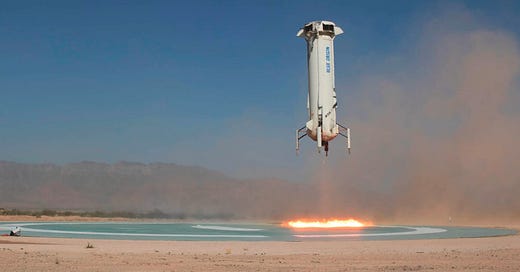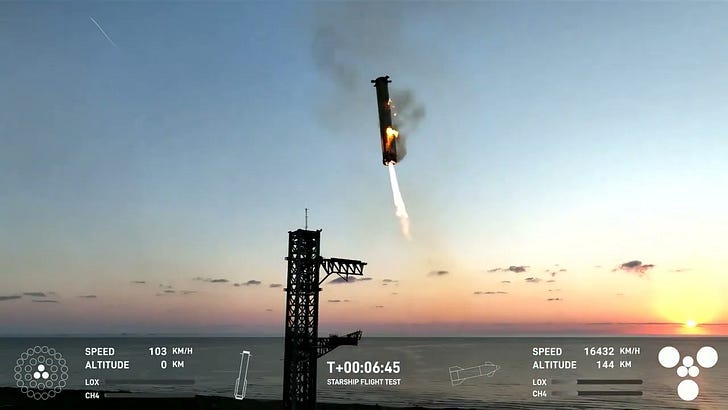Jeff Bezos Wants You to Think He’s Elon Musk—But He’s Not Even Close
The American public deserves better for its money.
by Craig Bergman
October 24, 2024
In a classic case of “fake it ‘til you make it,” Jeff Bezos is trying to pull off a SpaceX-style stunt with his latest booster landings. Yes, his company Blue Origin just managed to stick the landing of a booster, but don’t be fooled by the sleight of hand.
This isn’t the beginning of some new era of space exploration. It’s an overpriced carnival ride, packaged to look like serious spacefaring ambition, but in reality, it’s nothing more than glorified high-altitude tourism for bored billionaires.
Let’s be clear: New Glenn and its predecessor New Shepard are not spacecraft. They are expensive toys that can’t get anywhere near space in any meaningful sense. Unlike SpaceX’s fleet of reusable rockets that routinely carry people, cargo, and satellites into orbit (and yes, even to the International Space Station), Blue Origin’s craft are incapable of such feats.
They don’t put satellites into orbit, they don’t ferry cargo to the ISS, and they certainly aren’t capable of sustaining long-duration missions. The most ironic twist? Amazon, the tech behemoth Bezos built, pays SpaceX to launch its competing internet satellites into orbit. Think about that: Bezos relies on his competitor to do what his own rockets cannot.
New Glenn isn't a spacecraft. It's a zero-gravity ride that relies on nothing more than falling back to Earth, giving a handful of thrill-seekers a fleeting moment of weightlessness before gravity pulls them back. Sure, it looks flashy, but behind the slick marketing lies the uncomfortable truth: Blue Origin is light-years behind SpaceX in real space capabilities.
The public relations push surrounding these landings is designed to make Bezos look like the next Musk, but no amount of branding can cover up the reality. Worse yet, taxpayers are footing the bill for this charade. Blue Origin has secured lucrative NASA contracts, specifically for building components of the Artemis mission that aims to return humans to the Moon.
Here’s the kicker: Bezos’ team is over budget, behind schedule, and there’s virtually no chance they’ll meet the already-delayed 2026 deadline, which itself was a pushback from the original 2024 target. How long will NASA—and the American public—keep accepting excuses while dollars disappear into the black hole of Blue Origin's empty promises?
It’s not just Blue Origin. ULA (United Launch Alliance), which is effectively a Lockheed Martin and Boeing conglomerate, is in the same sinking boat. They, too, are over budget and woefully behind schedule. Their contributions to NASA’s Moon mission are supposed to involve the rocket that will launch Artemis, but delays and ballooning costs have pushed everything back by years.
Here’s an idea: if ULA can’t build a rocket after five times the funding and two extra years compared to SpaceX, why not let the company that’s actually delivering results take the reins?
SpaceX’s Starship is ready and waiting, and with it, a fully functional crewed mission system. But don’t expect NASA to make that call anytime soon. Why? Because SpaceX would send the best astronauts for the job—regardless of gender or ethnicity. NASA and the Biden-Harris administration, meanwhile, are obsessed with diversity optics, handpicking crew members based on quotas rather than qualifications. This isn't about choosing the best team for the mission; it’s about ticking the right political boxes.
The tragic irony is that while Bezos plays pretend in the desert and ULA stumbles over its bloated budget, SpaceX is quietly advancing the future of space travel. Starship is gearing up for its sixth integrated flight test (IFT-6), with another booster catch and potential full Starship landing scheduled as early as November. All this, while Blue Origin has yet to put a single person into meaningful orbit.
In short, Bezos is pretending to be Musk, but he's not even in the same league. While SpaceX is pushing the boundaries of human spaceflight, Blue Origin is content to charge the ultra-wealthy for a few minutes of weightlessness, all while burning through taxpayer dollars with little to show for it. The American public deserves better. We deserve real space exploration, not empty promises and overpriced zero-g rides.
— This essay was originally published on Facebook.





